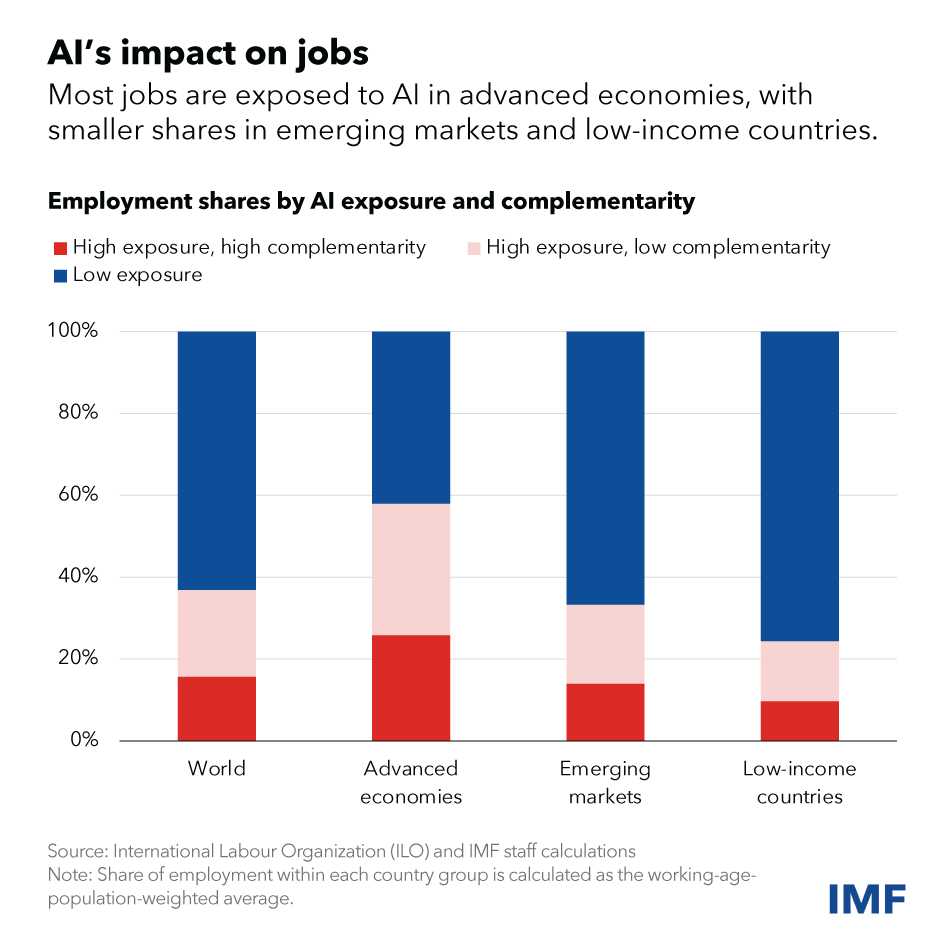According to IMF’s managing director, Kristalina Georgieva, AI technology is poised to impact nearly 40% of jobs worldwide, presenting opportunities and challenges.
Georgieva stresses, “In most scenarios, AI will likely worsen overall inequality,” underscoring the need for strategic policy interventions to harness AI’s benefits while mitigating its risks.
The IMF’s analysis further revealed a stark variation in AI’s impact across different economies.
In advanced economies, approximately 60% of jobs could be influenced by AI, with half potentially benefiting from enhanced productivity due to AI integration.
However, there’s a flip side: AI could displace human skills, diminish labor demand, impact wages, and, in extreme cases, eliminate jobs entirely.
The projected impact is 40% and 26% in emerging markets and low-income countries, respectively.
The research further shows a substantial risk of AI exacerbating income and wealth inequality both within and between countries. High-income and younger workers might benefit more, while low-income and older workers could be disadvantaged.
Georgieva points out, “Many of these countries don’t have the infrastructure or skilled workforces to harness the benefits of AI,” highlighting a growing risk of technology inequality.

The IMF also indicated that workers adept at utilizing AI could see increased productivity and wages, while others might fall behind.
This feeds into the ‘adapt or die’ narrative of AI adoption for both individuals and companies.
“Adapt or die.”
Tell me, how does one ‘adapt’ to this.
People who think AI is going to be an infinite money printing machine for everyone never took an economics class or learned what inflation is. You’re being sold a lie. pic.twitter.com/ZmQCbegZGF
— Reid Southen (@Rahll) January 14, 2024
Research in 2023 indicated how far AI labor disruption might extend, but 2024 thus far has seen some of these forecasts come into reality. Recent controversies involving companies replacing artists with AI and layoffs at Duolingo indicate this rising trend.
Last year, tech bosses like OpenAI CEO Sam Altman and Nvidia CEO Jensen Huang urged young people to invest time in learning AI.
Recognizing the challenges, Georgieva emphasizes the importance of comprehensive social safety nets and retraining programs, asserting, “It is crucial for countries to establish comprehensive social safety nets and offer retraining programmes for vulnerable workers.”
The AI Preparedness Index
In response to its research, the IMF developed the AI Preparedness Index to assist countries in preparing for AI’s impact.
This tool evaluates readiness across domains like digital infrastructure, labor market policies, innovation, and regulatory frameworks.
The index reveals that wealthier nations, including advanced and some emerging economies, are generally more prepared for AI adoption.
The global response to AI’s rise includes steps toward regulation. For instance, the European Union (EU) is moving towards implementing the world’s first comprehensive AI laws, with the European Parliament set to vote on these proposals.
The IMF’s research comes ahead of the World Economic Forum (WEF) in Davos, Switzerland. The WEF recently published that 79% of top economists predict that generative AI will significantly enhance production efficiency in high-income regions this year, while 74% foresee a boost in innovation.
94% of economists expect these productivity improvements to have a considerable economic impact on high-income economies over the next five years. In contrast, only 53% believe low-income economies will experience similar gains.
Regarding employment, the outlook is less favorable. About 73% of economists do not expect AI to positively influence employment in low-income economies. Nearly half (47%) express similar reservations for high-income economies.
In conclusion, as Georgieva aptly puts it, “The AI era is upon us, and it is still within our power to ensure it brings prosperity for all.”
The evidence underlying this statement paints a nuanced picture where productivity and disruption are finely balanced.





